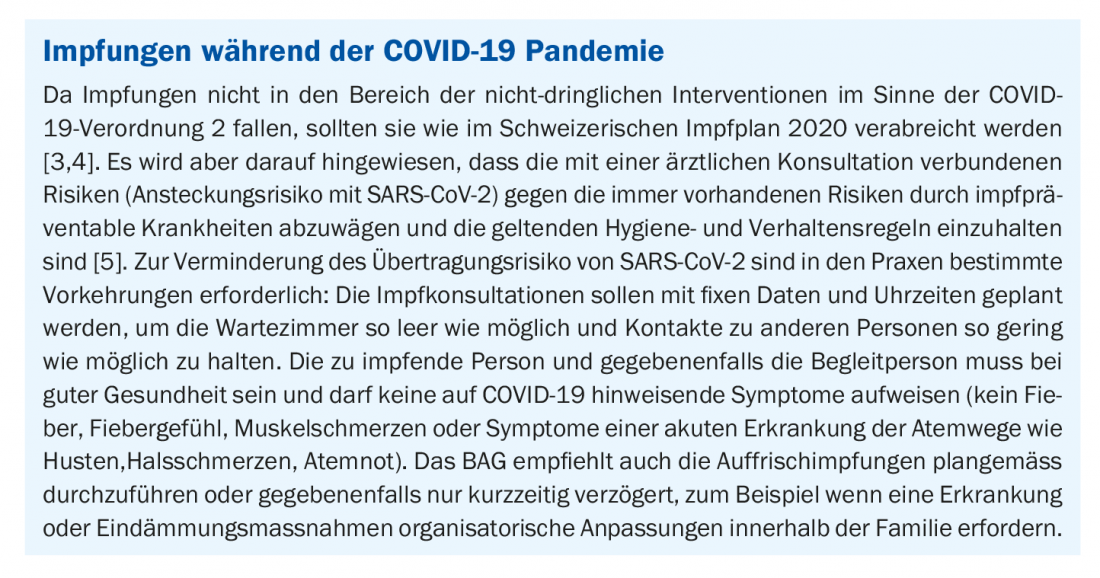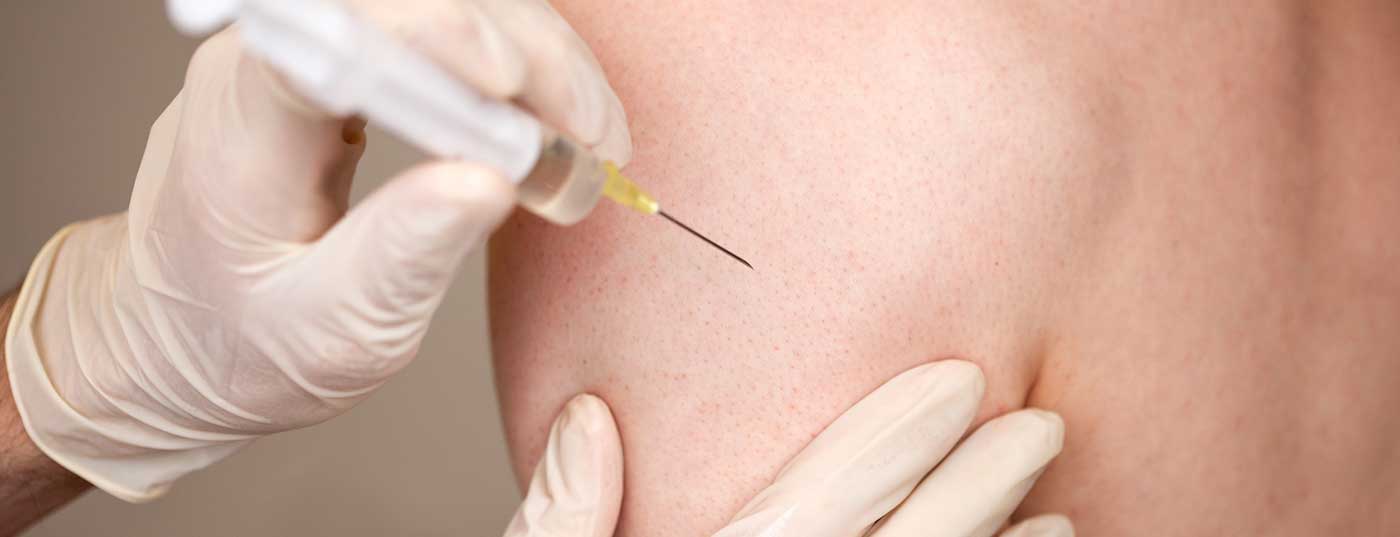With the exception of an extension of the recommendation of pneumococcal vaccination to persons with celiac disease and a separate chapter on the topic of information and requirements for the assumption of costs for the recommended vaccinations, the Swiss Vaccination Plan 2020 is unchanged from the previous year.
On the occasion of the current coronal pandemic, the Federal Office of Public Health (FOPH), in collaboration with the Federal Commission for Immunization Questions (EKIF), has produced a separate handout in addition to the vaccination schedule with general instructions on the implementation of vaccinations (as of 06.04.20) (box) [1].

The most important facts for the family doctor
The recommendations in the Swiss Vaccination Plan 2020 are the same as those of 2019, except that celiac disease patients are now included in the group of at-risk persons for whom pneumococcal vaccination is recommended [1,2]. Basic immunizations are recommended because they are relevant to individual and public health. The supplementary vaccinations are intended to provide optimal individual protection against clearly defined risks. Vaccinations for at-risk groups aim to protect particularly vulnerable populations, such as premature infants or individuals with immunodeficiencies, as they are at increased risk of severe complications from infectious diseases. The following summary with the most important facts is based on the practical notes on the Swiss Vaccination Plan 2020 of the mediX association [2]:
TBE: Recommended for all persons 6 years of age and older in endemic areas. For complete vaccine protection, 3 doses, refresh every 10 years. Over 60-year-olds may need to refresh every 5 years if they are exposed (regular outdoor exposure). The first two doses of vaccine optimally between the end of October to the end of February; a single vaccination does not protect in the following season. The regimen for rapid immunization is as follows: Encepur®: 0, 7, 21 d; TBE-Immun®: 0, 14 d, 5-12 Mte.
Flu vaccination: optimal between mid-October and mid-November, vaccination lasts 4-6 months. Efficacy depends on the age and immunocompetence of the vaccinated, as well as the match of vaccine antigens with circulating influenza viruses. It is recommended to use the quadrivalent vaccine, including for children and pregnant women. Those who fall ill with influenza despite vaccination usually suffer a milder course and less frequent complications and hospitalizations. The side effects are minimal, which is why the vaccination is usually worthwhile. For >65-year-olds and medical personnel, the health insurance company covers the costs. Also recommended for pregnant women until 4 weeks after birth.
Hepatitis A: Travelers to countries with moderate to high endemicity, as well as men with sexual contact with men and persons with occupational contact with drug users and/or persons from countries with high endemicity should be vaccinated. Furthermore, sewerage workers and employees of sewage treatment plants as well as patients with chronic liver disease. For secondary prevention, administer within 7 days of exposure.
Hepatitis B: Titer determination only useful at the time 1-2 months after vaccination, because the antibodies can disappear from the serum after a few years. Vaccine protection persists thanks to immunological memory. Vaccination is recommended for all children and adolescents. Especially for risk groups such as persons with chronic diseases and immunosuppressed persons as well as medical and nursing staff and persons with frequently changing sexual partners or contact persons of HBsAg-positive persons and staff of social institutions, homes, police, prisons. Basic hepatitis B vaccination is recommended for infants with a hexavalent combination vaccine with vaccinations at 2, 4, and 12 months of age. Vaccination at age 11-15 years for adolescents not previously vaccinated against hepatitis B remains recommended.
Herpes Zoster: Zostavax® can be vaccinated from 65-80 years of age (single vaccination), the effect is limited and vaccine protection decreases with years after vaccination. Since this is a live vaccine, only immunocompetent individuals should be vaccinated. The costs are not covered by health insurance. There is a vaccination recommendation for at-risk individuals aged 50-79 years if immunosuppressive therapy is planned. Vaccination should be given 4 weeks before the start of therapy. Individuals who already have “mild” immunodeficiency should also be vaccinated. However, only when there is evidence of humoral immunodeficiency such as hypogamma, dysgammaglobulinemia – patients with cellular immunodeficiency are contraindicated. Furthermore, immunocompetent individuals aged 65-79 years can be vaccinated regardless of varicella or zoster history, and without prior serology. Shingrix® (inactivated vaccine) is not yet licensed in Switzerland. This is a vaccine that is associated with a significantly higher protection rate, but can currently only be obtained from abroad.
HPV: HPV vaccination is recommended as a basic vaccination for girls between 11 and 14 years of age, and a booster vaccination for all young women between 15 and 19 years of age who have not yet received a vaccination – even if they have already had sexual relations. In individual cases also still in young women between 20 and 26 years. HPV vaccination is recommended as a supplemental vaccination for boys between 11 and 14 years of age, and a booster vaccination for young men between 15 and 19 years of age; in individual cases, it is also recommended for young men between 20 and 26 years of age. The cantonal vaccination programs cover the costs only if the first vaccination was given before the 27th birthday. The 9-valent Gardasil 9® vaccine broadens protection without sacrificing efficacy, and local side effects are usually mild and no more common than with other vaccines.
Meningococcal: Supplemental meningococcal vaccination has been recommended since 2019 against the four serogroups A, C, W, Y (Menveo®) for children 24 months of age. In healthy individuals aged 11-19 yrs, vaccination is optional (1 dose). Further recommended for persons with immune disorders and recruits, in case of functional or anatomical asplenia, deficits of the complement system, homozygous protein S and C deficits, during stay (> 1 month) in an endemic area or also during a short stay in an epidemic area (costs to be borne by the traveler).
MMR: Vaccination 2× for all persons younger than year of birth 1963, if not documented. Individuals born in 1963 and older are assumed to have been exposed to the wild type. Interval of at least 1 month between vaccinations. Serologies are discouraged because they are not very informative. According to the 2019 vaccination schedule, the 1st dose of MMR vaccine will be given as early as 9 months of age, and the 2nd dose will be given at 12 months of age. Since there are 3 vaccinations on the schedule at 12 months, the 2nd MMR vaccination can be postponed for one month, meaning that at the 12 month consultation, parents will be asked to have the 2nd MMR done at the MPAs in one month, without doctor consultation.
Pertussis: Goal: Protect infants <6 months. For pregnant women end of 2nd trimester in any pregnancy. In addition, fathers, grandparents because of contact with unvaccinated infants, if vaccination >10 years ago, daycare center employees, etc. Pertussis is only available in combination with diTe or diTeIPV. So at each Te booster vaccination consider a combination with pertussis vaccination
Pneumococcus: One-time use for risk groups, for example in chronic diseases and before immunosuppressive therapy. Those who have been vaccinated with the 23-valent vaccine (Pneumovax®) should be revaccinated with the 13-valent (Prevenar®). This is not paid by the health insurance. Prevenar is off-label for adults, but there is an official recommendation. The duration of action is 5-10 years, yet no booster is currently recommended. Pneumococcal vaccination of children <5 years is recommended as a basic vaccination and no longer as a supplementary vaccination. The vaccination schedule for infants remains at 3 doses at 2, 4, and 12 months of age.
Poliomyelitis: As of 2019, the recommended basic polio vaccine includes 4 doses. For infants first vaccinated with the 3+1 vaccination schedule before 2019, the 5-dose vaccination schedule remains in effect. After the basic vaccination, regular revaccinations are no longer necessary. For stays in Africa and partly in Asia, a booster is still recommended every 10 years (ideally combined with diTe [Per]).
Pregnant women: No live vaccinations (MMR, varicella), so vaccinate before planned pregnancy, up to a maximum of 1 month before pregnancy. Influenza and pertussis (2nd trimester) should be vaccinated during SS, as the antibodies are also transferred to the unborn child and protect it. Therefore dTpa in every pregnancy, flu vaccination seasonally.
Tetanus and diphtheria: If never vaccinated before: vaccinate 3 doses at 0, 2 and 8 month intervals. Otherwise, 1 booster at age 25-30 years and then every 20 years. From 65 on again every 10 years, because the immune system is less efficient with increasing age. Distance of tetanus vaccinations can also be less than 2 years, there is then simply a stronger local reaction. Always consider whether additional vaccinations against pertussis (contact with infants) and/or polio (stays in Africa/Asia) are indicated at the same time.
Rabies: Only two vaccinations are needed for basic immunization (according to WHO guideline), ideally at 0 and 21-28 days, depending on the case also 0 and at least 7 days possible. Started basic vaccination series can be adjusted (only 2 instead of 3). After one year at the earliest, a booster vaccination is recommended if another trip to a risk area is planned. Thereafter, booster vaccinations are given only after animal bites (then two vaccinations, as soon as possible, ideally 0-1 and 3 days after the bite). The booster after animal bite is not required if the last rabies vaccination was less than 3 months ago (basic vaccination or booster).
Varicella: If not had it: 2 vaccinations 1 month apart (be sure to schedule before pregnancy). Determination of VZV IgG antibodies in the case of negative or doubtful varicella history may be useful at the recommended vaccination age (11-40 years). The alternative with vs. without antibody determination can be discussed individually with the patient, as both approaches have advantages and disadvantages. The costs are not covered by health insurance. People vaccinated against varicella also have a very low chance of contracting herpes zoster. Moreover, if they do fall ill, the course is only mild.
Literature:
- BAG: Swiss Vaccination Plan 2020, www.bag.admin.ch/impfplan, last accessed 28.08.2020
- Verein mediX: Praktische Hinweise zum Schweizerischen Impfplan 2020, www.medix.ch/wissen/guidelines/factsheets/impfungen-2020.html, last accessed 28.08.2020.
- COVID-19 Regulation 2: Regulation 2 on measures to control coronavirus (COVID-19) of March 13, 2020 (as of June 20, 2020), www.admin.ch/opc/de/classified-compilation/20200744/index.html, last accessed Aug. 28, 2020.
- BAG: Campaign, www.bag-coronavirus.ch, last accessed 28.08.2020
- FOPH: Handout, Vaccinations during the COVID19 pandemic (as of 04/06/2020), www.bag.admin.ch, last accessed 08/28/2020.
HAUSARZT PRAXIS 2020; 15(10): 52-53 (published 10/27/20, ahead of print).











